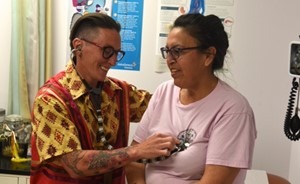Planning ahead: Your wishes
Some people avoid thinking or making decisions about their future needs. By giving thought to your wishes and preferences now, you can be better prepared for changes in your health.
If there comes a time when you’re not able to make decisions or communicate your wishes, it will be important that you’ve found ways to deal with whatever situations may come up. Decisions about your care need to be based on an inclusive approach that respects you and your wishes.
Because discrimination, lack of knowledge, or incorrect assumptions can lead to care that isn’t inclusive, it’s wise for you to be proactive by identifying your concerns and taking action to address them.
“I think a lot of us don’t go to a lawyer or financial planner about a will or Advance Care Plan because it means coming out all over again.”
Some areas of concern that you might have include healthcare, personal care, finances, and interpersonal relationships. The following situations give examples of more specific concerns, along with ways that you might address them.
|
Situations and concerns |
Take action now |
|
What if I become seriously ill or injured, and my parents or ex-spouse interfere with my care or oppose my partner or chosen family in carrying out my wishes?
|
|
|
What if I can no longer communicate my wishes about my care?
|
|
|
What if I’m moved into a care home where staff will treat me poorly if my 2SLGBTQ+ identity is known? What if my partner and friends can’t visit? |
|
|
What if I develop dementia or become too ill to manage my money? |
|
|
How can I remain in my own home if I become very ill or am dying? |
|
|
What if I die and my partner is forced out of our home? |
|
Some concerns may affect you directly, while others may affect people important to you. Some concerns may affect your health and well-being, while others may affect your peace of mind. For example, you may have wishes about the care of your body after death, or about funeral or other arrangements.
Planning can bring you comfort and reassurance that your wishes will be respected.
In this series of articles, you’ll find information to help you plan and avoid difficulties that can arise when you’re no longer able to speak for yourself or make decisions.
Some of the more specific topics include:
- Making an advance care plan: This provides a way for you to express your wishes about medical and other care and is important in communicating these when you’re no longer able to speak for yourself.
- Choosing a healthcare advocate: By naming a legal representative, you can have someone you trust to represent you when you can’t speak for yourself.
- Choosing a financial advocate: By legally naming someone to make financial decisions if you’re no longer able, you can protect yourself from financial abuse and feel more confident that your money will be used for your benefit and as you would wish.
- Making a will: A legal will helps ensure that material possessions, such as your home or savings, are passed on to those you’ve chosen. You may also choose to create a companion document, such as a ‘legacy will’, which expresses the essence of who you are, what you value, and what you wish to leave for the benefit of others, aside from money or material possessions named in your legal will.
Read more
Videos
More Articles

Leaving a legacy

What does "2SLGBTQ+" mean?

Managing difficult situations

How to be an ally

How to provide inclusive care to Two-Spirit & LGBTQ+ people

Getting the care that you need

About your grief

Choosing a healthcare advocate

Finding 2SLGBTQ inclusive care

Making an advance care plan

Choosing a financial advocate

Making a will

Finding inclusive continuing care

Why inclusivity matters

For family, friends, and unpaid caregivers

Canadian Healthcare Bill of Rights

My Choices for Safe and Inclusive Healthcare
Featured Content

2SLGBTQ+ Canadian Healthcare Bill of Rights
Read More
MyGrief.ca Module - Grief in 2SLGBTQ+ communities
Read More
My Choices for Safe and Inclusive Healthcare
Read More
Planning for My Care
Read More
2SLGBTQ+ Knowledge Synthesis
Read More
Webinar: Improving access to respectful & inclusive care.
Read More
2SLGBTQ+ Canadian Healthcare Bill of Rights Infographic
Read More



